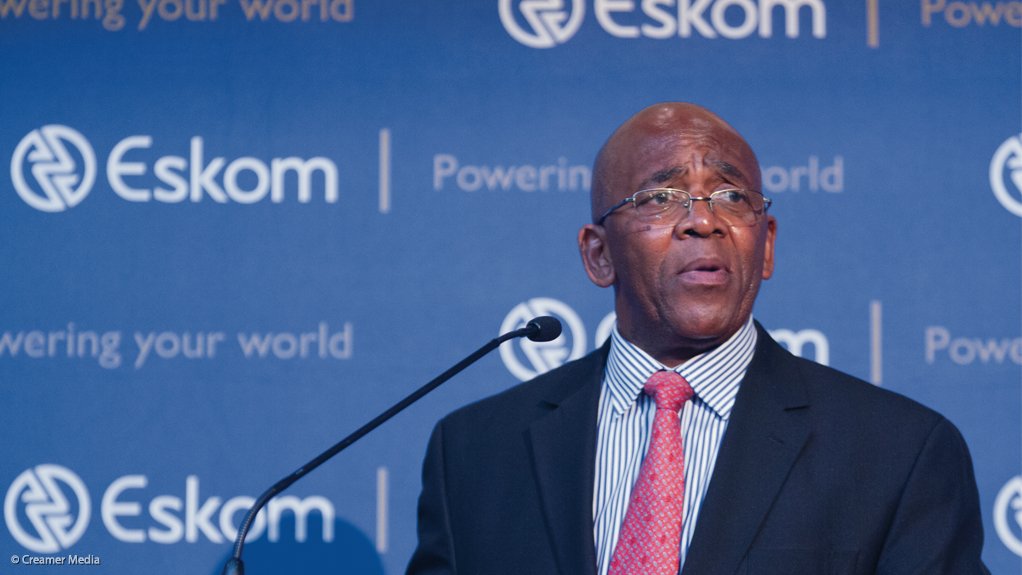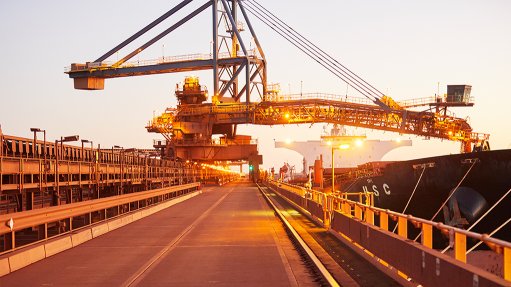Eskom suspends CEO, other top execs amid three-month inquiry
Eskom chairperson Zola Tsotsi announced the shock suspension on Thursday of four senior executives, including CEO Tshediso Matona and FD Tsholofelo Molefe, following a board decision to institute a three-month inquiry into the state of the troubled business.
Executive for group capital Dan Marokane and acting group executive for commercial and technology Matshela Koko were also suspended.
Eskom nonexecutive director Zethembe Khoza would step in as acting CEO. He would be supported by acting FD Nonkululeko Veleti, acting executive for group capital Abram Masango and acting executive for commercial and technology Edwin Mabelane.
Tsotsi said the inquiry, which had the blessing of the shareholder, would be led by independent advisers, who would be appointed within a week – lawyer Nick Linnell had already been selected to coordinate the intervention and that board audit and risk committee would oversee the process.
Eskom indicated that the inquiry would look into the current state of the business and offer an independent view on the poor performance of the generation fleet, delays to capital projects, the high cost of primary energy and the utility's cash-flow challenges.
"We have asked these [four] executives – in the interest of achieving a result that we believe can only be achieved through a very unfettered and transparent process – to step aside so that they can allow this process . . .to proceed. And even though we have invoked the word suspension, there is no suspicion of wrongdoing – so there are no charges," Tsotsi outlined.
Public Enterprises Minister Lynne Brown immediately welcomed the board’s decision to launch “a comprehensive and holistic audit”.
FACT FINDING VS DEEP DIVE?
But while Tsotsi framed the probe as a “fact-finding” exercise, Brown argued that it should be “deeper than a mere fact-finding exercise and it should be a deep-dive into the company to tell us what is wrong and how it should be fixed”.
“As shareholder representative, I am concerned about the instability at power plants; the financial liquidity of the utility; the lack of credible information; the unreliable supply of electricity and its dire impact on our economy; progress with the build programme; overruns at Medupi and Kusile; delays of the investigation into incidents at Majuba and Duvha; and the issue of coal and diesel pricing,” she said in a statement, which indicated that the inquiry might be broadened beyond the four areas outlined in Eskom’s communiqué.
Her statement also stood in stark contrast to Tsotsi's argument that "the [word] investigation is a misnomer".
"This is a fact-finding inquiry," Tsotsi said at a hastily convened media conference at Megawatt Park. "But if, in the process . . . we encounter things that are either improper or seem to suggest, or are alluding to, improper conduct, then obviously we have to attend to those things," he added, while stressing that the inquiry was "not setting out with that objective in mind".
He also indicated that he did not anticipate, given the limited duration of the inquiry, that it would be a "deep dive" into the specific areas of concerns with regards the performance of the coal-fired fleet. "But it will create a platform for us . . . to [possibly] doing an audit of all the generation units."
But even Brown’s extended list dealt with well-known problems, for which diagnoses and remedies had been canvassed at various Eskom and non-Eskom forums, including the newly launched electricity war room. Brown had also never before contradicted either Eskom management’s analysis of the problems, nor management's proposed remedies.
All of the problems also predated the appointment of all four suspended executives to their current roles.
In fact, Matona only took up the position of CEO on October 1, 2014, following a board-led and Cabinet-endorsed process to find a successor to Brian Dames. Of the three other suspended executives, only Molefe, who took over as FD from Paul O'Flaherty in January last year, had occupied her current position ahead of Matona's appointment.
Despite the fact that the underperformance of the generation fleet would be probed, group executive for generation, Mongezi Ntsokolo, who was also only appointed to his current position after Matona’s October appointment, had not been suspended. His predecessor Thava Govender, who switched portfolios with Ntsokolo and is currently group executive for transmission and customer services, was also not suspended.
The suspension decision was made during a board meeting on Wednesday March 11, which was attended by the full complement of the new board.
The board itself was only appointed on December 10 last year and, besides Tsotsi, who was reappointed chairperson, it comprised: Chwayita Mabude, Norman Tinyiko Baloyi; Dr Pathmanathan Naidoo; Venete Klein; Nazia Carrim; Romeo Kumalo; Mark Pamensky; Zethembe Khoza; Dr Baldwin Ngubane; and Viroshini Naidoo.
Tsotsi indicated that it had been a long meeting, which had involved much "soul-searching". The intention was to offer the board an independent view and to establish a "base line" for better decision-making.
"There is no sinister, hidden agenda on the part of the board. You need to appreciate that the board has just come on board and it needs to establish a benchmark base line of where the organisation is at, independently."
MIXED REACTION
There was mixed reaction to the news, with one key Eskom trade union welcoming the move, another questioning it and a leading analyst warning that the news added “further negativity to the Eskom bond story and sovereign credit”.
Trade union Solidarity, which had 7 000 members working at the utility, welcomed the suspensions and expressed hope that the independent inquiry would pave the way for changes to Eskom’s “management style”, which its energy industry head Deon Reyneke identified as a key reason for the exodus of “highly skilled and experienced individuals”.
Reyneke said he hoped the inquiry would lead to Eskom appointing skilled and experienced persons instead of individuals with political connections. “The time has come for Eskom to be run like a business and not a state department.”
But another key Eskom union, the National Union of Mineworkers (NUM), said it was "surprised and shocked" by the suspensions.
"It means that there is a collapse of governance. We would have expected the chairperson of the board to be fired. We did raise a concern about the reinstatement of this chairperson when the new board [had] been established.We reject the suspensions of the four executive because we were never consulted. We think that there is a bigger picture rather than to gun for these four executives," NUM general-secretary Frans Baleni said in a statement.
"The timing is also bad because we had just made a call for Save Eskom Campaign doing things differently including the involvement of labour. Couldn't there be a better approach to dealing with the concerns they are having. Nobody is saying somebody is corrupt or abused the resources. Government must also take responsibility rather than penalise certain individuals," Baleni added.
Nomura’s Peter Attard Montalto also questioned the need for an inquiry and suggested the move did not indicate that the crisis at Eskom was being sorted out or dealt with. Instead, he argued that it was doing the “exact opposite”.
“[The inquiry] is an unnecessary distraction at a time when Eskom needs decisive, stable and strong leadership,” he wrote in a note, while also suggesting that the move might be motivated by unhappiness by Congress of South African Trade Unions-aligned unions with Matona’s leadership style.
“Overall, we still do not believe the government fully understands the crisis that is occurring on energy security – as evidenced by the delays in providing an equity injection and this announcement.”
The South African Communist Party (SACP), offered a different take, arguing that Eskom was a "national asset that now requires tough love".
"While in the middle technical ranks there are many committed professionals doing excellent work, in the senior technical and especially managerial levels there have been many weaknesses and even complacency. There are many indications that Eskom has been treated as a milk-cow by private sector rent-seekers. The pricing and procurement of coal supplies to Eskom power-stations, and indications of serious manipulation of procurement of diesel for the open cycle turbines must be dealt with," the SACP said.
Meanwhile, the National Union of Metalworkers of South Africa's emerging political movement United Front called for a judicial enquiry into the management of the electricity utility, as well as for an urgent civil society conference on the electricity crisis.
"The United Front is not convinced that team that the chairperson of Eskom’s board of directors Zola Tsotsi announced will be able to get to the bottom of the problems at the State-owned electricity company. The Eskom audit and risk committee may be implicated in the mismanagement within Eskom. It is for this reason that the United Front is calling for an independent judicial commission of enquiry."
Comments
Press Office
Announcements
What's On
Subscribe to improve your user experience...
Option 1 (equivalent of R125 a month):
Receive a weekly copy of Creamer Media's Engineering News & Mining Weekly magazine
(print copy for those in South Africa and e-magazine for those outside of South Africa)
Receive daily email newsletters
Access to full search results
Access archive of magazine back copies
Access to Projects in Progress
Access to ONE Research Report of your choice in PDF format
Option 2 (equivalent of R375 a month):
All benefits from Option 1
PLUS
Access to Creamer Media's Research Channel Africa for ALL Research Reports, in PDF format, on various industrial and mining sectors
including Electricity; Water; Energy Transition; Hydrogen; Roads, Rail and Ports; Coal; Gold; Platinum; Battery Metals; etc.
Already a subscriber?
Forgotten your password?
Receive weekly copy of Creamer Media's Engineering News & Mining Weekly magazine (print copy for those in South Africa and e-magazine for those outside of South Africa)
➕
Recieve daily email newsletters
➕
Access to full search results
➕
Access archive of magazine back copies
➕
Access to Projects in Progress
➕
Access to ONE Research Report of your choice in PDF format
RESEARCH CHANNEL AFRICA
R4500 (equivalent of R375 a month)
SUBSCRIBEAll benefits from Option 1
➕
Access to Creamer Media's Research Channel Africa for ALL Research Reports on various industrial and mining sectors, in PDF format, including on:
Electricity
➕
Water
➕
Energy Transition
➕
Hydrogen
➕
Roads, Rail and Ports
➕
Coal
➕
Gold
➕
Platinum
➕
Battery Metals
➕
etc.
Receive all benefits from Option 1 or Option 2 delivered to numerous people at your company
➕
Multiple User names and Passwords for simultaneous log-ins
➕
Intranet integration access to all in your organisation





















